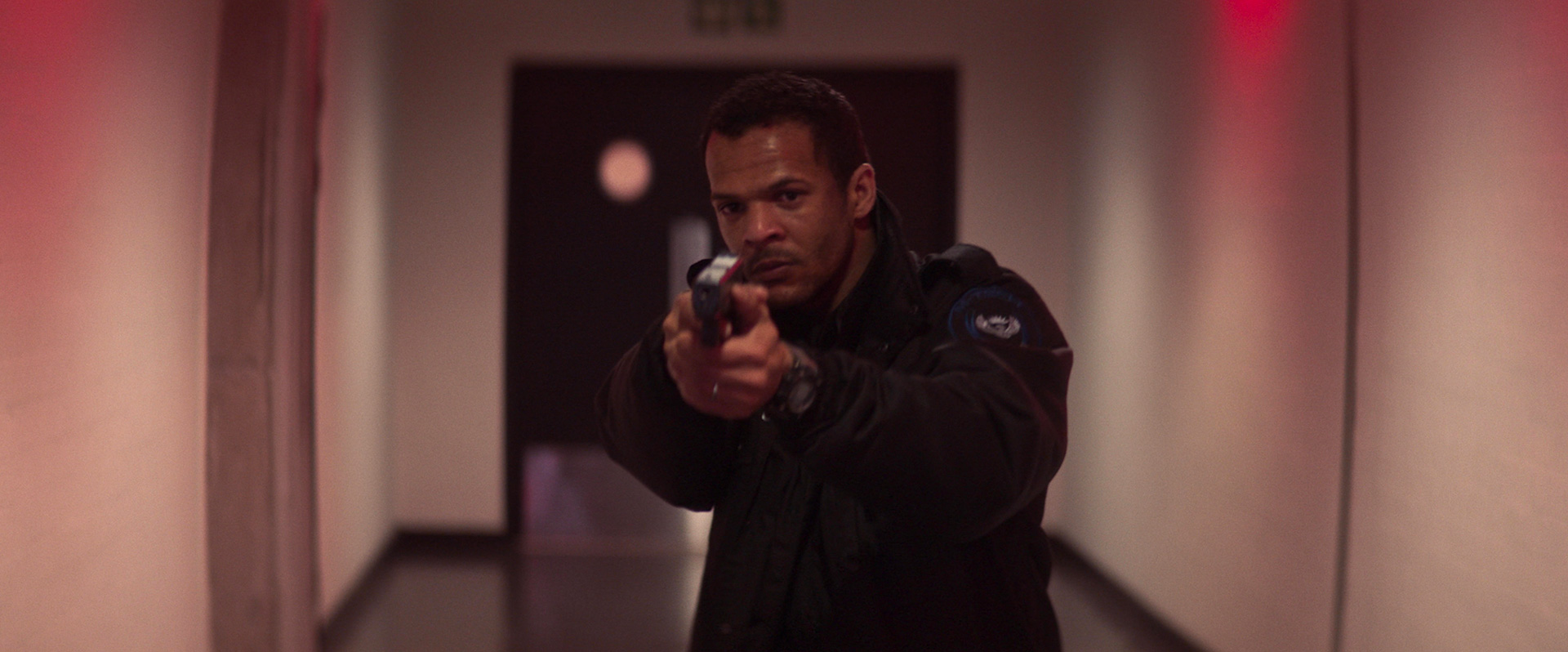Theo Abrams (Jarrid Geduld) jumps into action with CPR upon waking to find his wife’s (Nicole Fortuin’s Angela) dead body by his side. He then immediately clams up when a knock at the front door is accompanied by the declaration “Police!” He doesn’t remember hearing anyone enter their room that night nor recalls a violent struggle. Add the fact that he just lost his job due to an inability to overcome the PTSD he’s been battling since blaming himself for the deaths of two firefighters under his command and he’s forced to wonder if he’s responsible for Angela too. Theo’s temper and anxiety have been in overdrive and his wife felt the brunt of both. If he can’t trust his own innocence, who can?
This is the question we ask ourselves despite having already processed the fifteen or so minutes of exposition that writer-director Travis Taute provides at the start of his feature debut Indemnity. It’s an interesting conundrum, too, considering what he’s explained: somebody is trying to kill Theo. According to whistleblower Sam Isaacs (Abduragman Adams), South Africa’s largest defense contractor (M-Tech) has a confidential file housing four hundred-plus names of men and women who have either died, been arrested for violent crimes, or simply disappeared. Theo was the only local name who picked up the phone—though it was Angela who answered. Being a respected journalist, Sam decides to tell her everything to break the story. And then, after relaying the conspiracy theory to Theo, she’s murdered.
Who, then, was really targeted? Theo? Or his wife? Perhaps Theo was in the “arrested” category rather than the “kill” category from the fact that an inevitable hit on Angela would supply her assailants the perfect fall guy: a confused, aggressive, unpredictable husband. What M-Tech head of security Ernst Viljoen (Louw Venter) didn’t take into consideration, however, is how motivated Theo would be to discover the truth and seek revenge to keep his son Wesley (Qaeed Patel) safe. Theo should have either been put behind bars or murdered himself before anyone could ask questions, or before he could relay what Angela told him about Sam. A car accident (ignited by his impressive fighting abilities) later finds him on the run with a mounting collateral body count.
That in turn places the police on his tail. Led by General Alan Shard (Andre Jacobs) and Detective Rene Williamson (Gail Mabalane), a case that should have been a slam-dunk domestic dispute keeps getting more complicated. They seek answers from Theo’s psychiatrist (Susan Danford’s Dr. Tunbridge), but she’s not willing to break confidentiality—as if he was ever forthcoming enough to supply her any necessary insight. It therefore comes down to boots-on-the-ground police work instead. They’ll have to follow Theo’s trail one step behind Viljoen, picking up the pieces of additional violence caused by those two colliding and the numerous questions, making them wonder whether their prime suspect is as guilty as originally thought. Only Theo can prove it, though, by finding the source of this nightmare.
The result is a two-hour genre mash-up of action and suspense. If Theo wasn’t just a firefighter known for saving approximately two hundred lives on the job before getting pulled into this intricate, politically motivated chess game, you could almost see Indemnity becoming the start of a South African Mission: Impossible or Bourne franchise. It plays like both with its three-pronged narrative attack (hero, police, bad guys) and its gradual dissemination of previously muddled or missing details. I’ll simply say the background announcement of a presidential assassination before Theo turns off the television isn’t throwaway dialogue. Something big is unfolding for which he’s only one small piece. He might also be the only one who can stop it.
And while not a spy, Theo isn’t afraid of fighting. Despite one death-defying stunt to get the heart pounding, the action is mostly relegated to short bursts of physically draining hand-to-hand choreography that Taute sprinkles in with the espionage plot via locales as small as an elevator car or as large as a corporate building complex manned by multiple armed guards. Geduld is ready for whatever the situation demands, desperation fueling his rage even when dealing with a couple of gunshot wounds. That Taute lets him get through people we assume have far more training is forgivable because Theo is a highly motivated father who knows what it’s like to grow up an orphan. He won’t let Wesley process his trauma alone.
If I were to single out one flaw from the whole, however, it would be how much information Taute throws us at once. He’s juggling the emotional weight of PTSD (it becomes a major through line that turns the film into a message-driven piece at times), his elaborately extensive conspiracy, a police procedural, and some twists and turns to keep the audience honest as far as who can be trusted. Every fight supplies new information to be processed and every aftermath sees the party arriving late, having to sift through what might have been missed. Taute leaves some room for a sequel should he so choose, but it’s almost like he’s trying to fit the overall mythology of a Treadstone into one movie instead of three.
The experience can be tiring because there are few breaks. Theo is either running head-first into a precarious situation or uncovering incriminating evidence that we must also absorb to understand the big picture. It works in the end, though, because we care about this character. We rally behind his lone wolf persona and become intrigued by Viljoen’s frustration and the police’s softening stance towards Theo’s guilt. Kudos to Taute for letting easy answers stand, too—regardless of how dark or depressing they prove. It ultimately goes back to PTSD keeping at its core. He’s looking to normalize the conversation and expose how poorly built the infrastructure is to combat psychological pain of first responders. Rather than exoneration, the goal is Theo finally confronting his demons.
Indemnity is playing the Fantasia International Film Festival.

